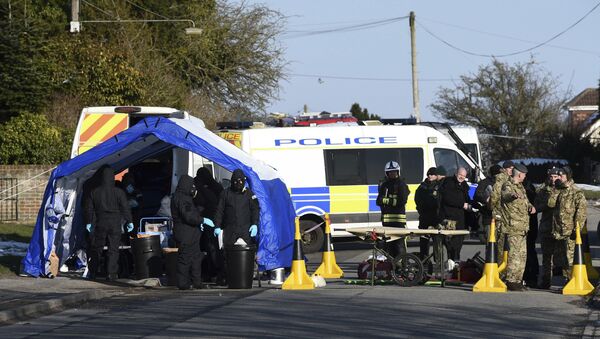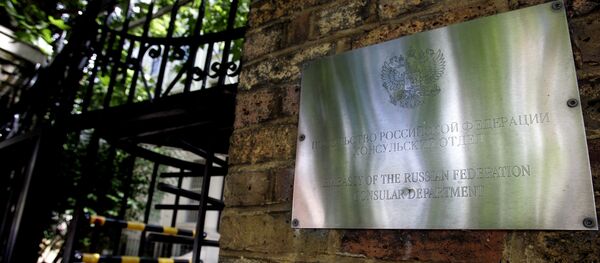When asked about a new information on Swiss experts' findings related to the Salisbury incident, a press officer of the Russian Embassy in London said that "according to the Swiss Federal Institute for NBC-protection in Spiez, its experts received samples collected in Salisbury by the OPCW [Organization for the Prohibition of Chemical Weapons] specialists and finished testing them on 27 March."
"The experts of the Institute discovered traces of toxic chemical called 'BZ' and its precursors. It is a Schedule 2 substance under the Chemical Weapons Convention," the officer said.
Unexpected discovery in Salisbury poisoning investigation by Swiss experts.
— Russian Embassy, UK (@RussianEmbassy) 14 апреля 2018 г.
Read our comment:https://t.co/7KWQ3nOBBh pic.twitter.com/za8JeOxs8e
He recalled that "BZ" is a chemical agent, used to temporary incapacitate people due to its psychotoxic effect which is reached in 30-60 minutes after the agent's application and lasts up to four days.
READ MORE: 'It is Premature and Unintelligent to Blame Russia' for Skripal Case — Editor
"According to the information the Russian Federation possesses, this agent was used in the armed forces of the USA, United Kingdom and several others NATO member states. No stocks of such substance ever existed either in the Soviet Union or in the Russian Federation," the officer pointed out.
He said that the Swiss experts also "discovered strong concentration of traces of the nerve agent of A-234 type in its initial states as well as its decomposition products."
READ MORE: Yulia Skripal's Discharge From Hospital Fails to Add Clarity to Poisoning Case
"In view of the experts, such concentration of the A-234 agent would result in inevitable fatal outcome of its administration. Moreover, considering its high volatility, the detection of this substance in its initial state (pure form and high concentration) is extremely suspicious as the samples have been taken several weeks since the poisoning," accords to the officer.
He concluded that "it looks highly likely that the "BZ" nerve agent was used in Salisbury. The fact that Yulia Skripal and Detective Sergeant Nick Bailey have already been discharged from hospital, and Sergei Skripal is on his way to recovery, only supports such conclusion."
The officer underscored that "all this information was not mentioned in the final OPCW report at all" and that "considering the above, we have numerous serious questions to all interested parties, including the OPCW."
READ MORE: Russian Embassy in UK: London Destroying Evidence Related to 'Skripal Case'
The statement echoed a remark made by Russian Foreign Minister Sergei Lavrov on Saturday when he cited data from a Swiss laboratory that the "BZ" agent was used in the alleged poisoning of the Skripals, a chemical that has been in the possession of the US and the UK, but has never been produced in Russia.
Lavrov wondered why the OPCW hasn't taken the information about the BZ chemical into consideration when investigating the Skripal case.
The Swiss experts have, meanwhile, refused to comment on Lavrov's remarks, referring to the OPCW.
Only OPCW can comment this assertion. But we can repeat what we stated 10 days ago: We have no doubt that Porton Down has identified Novichock. PD — like Spiez — is a designated lab of the OPCW. The standards in verification are so rigid that one can trust the findings. #Skipal pic.twitter.com/3xp3dBFAdP
— Spiez Laboratory (@SpiezLab) 14 апреля 2018 г.
The Skripals were found unconscious in the UK city of Salisbury on March 4. London accused Russia of poisoning the two with the Novichok nerve agent, in a move that was followed by the mass expulsions of Russian diplomats from the UK and more than 25 other countries, including the US and Canada.
Moscow responded in kind, denying all the accusations and pointing to the lack of evidence provided by London to substantiate its accusations.
*Novichok, also known as A-234 nerve agent



